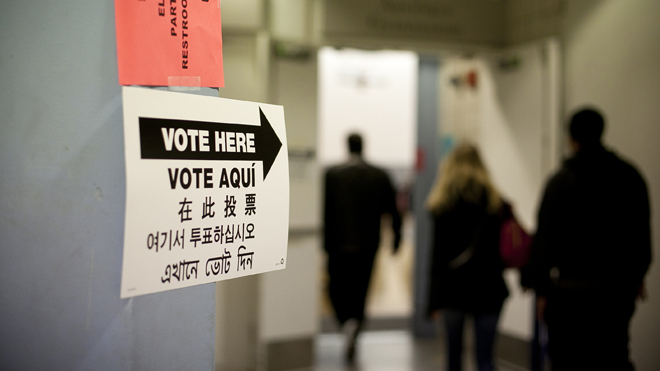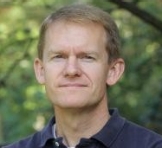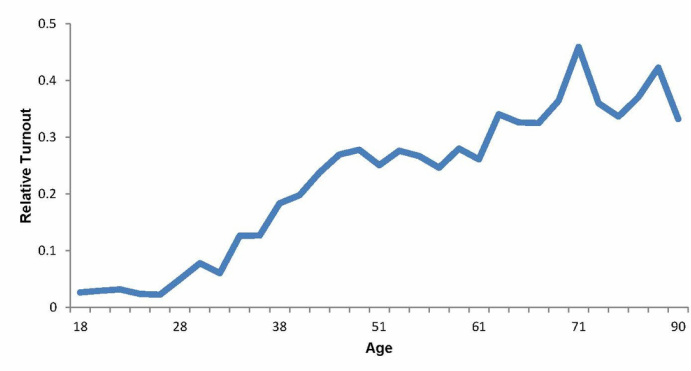By Patricia Hart
In the center of a Nepalese restaurant in Queens, a dozen IVote organizers crowded around a cluster of tables. The topic of discussion: coordinating an upcoming mock election for New York City immigrants. Scheduled to coincide with the city’s general election, the mock election is intended to raise awareness and support for immigrant voting in America’s largest city. The meeting’s location was apposite for its topic; it was held in Jackson Heights, one of the most diverse neighborhoods in New York City and the nation.
The restaurant buzzed with greetings and conversation, as members arrived and the circle of chairs expanded. I settled into my seat after a few handshakes and introductions. Ready to contribute to the process, I got out my notebook and familiarized myself with the material strewn across the table. It all seemed a bit haphazard at first glance, but once the meeting began, I quickly realized this group was in its element. From the logistics of counting the vote to the politics of spreading the event to the other boroughs, these community organizers exemplified how people can make a difference in getting jurisdictions to consider laws that expand voting rights.
IVote is a New York City-based coalition that was formed in response to discrimination against immigrants in the United States. They work to highlight the role noncitizens play in communities and bring suffrage rights to New Your City’s immigrant residents. Central to IVote’s work is correcting misconceptions about immigrant voting. One pervasive myth is that immigrant voting is a novel idea. It’s actually been around since our country’s founding. Historically, noncitizens have voted in 40 states and federal territories in local, state, and even federal elections. An upsurge of immigration in the late 19th century resulted in states curtailing noncitizen voting rights, as party leaders feared the uncertain electoral consequences of shifting demographics.
While the number of jurisdictions that allow noncitizens to vote has dwindled – only six Maryland towns permit immigrant voting, a significant departure from the majority of states at the turn of the 20th century – the policy is currently being considered by several localities. Four Massachusetts towns have passed local laws permitting noncitizen voting in city elections, but are waiting for the state’s approval, as they are subject to home rule. More than a dozen other cities are considering – or have recently considered – restoring immigrant voting rights, including New York, San Francisco, and Portland, Maine. Additionally, Seattle has established a taskforce to make voting more accessible for its foreign-born citizens.
As the largest city in the United States, New York’s adoption of noncitizen voting would signal a new day for immigrant voting rights. New York has an estimated 8.3 million residents, 1.3 million of which are immigrants. Under the proposed noncitizen voting bill, approximately 800,000 noncitizens would gain suffrage rights in city elections. If noncitizen voter turnout in New York City were to be equal to the overall turnout of the city’s electorate, the policy could mean an additional 100,000 to 200,000 voters in municipal elections. That would have a huge impact on who gets elected and their policy agendas. Immigrant voting would ensure that politicians have an incentive to craft policies that work for the immigrant community.
That being said, immigrant voting in New York City is a contentious issue and its fate is uncertain. The bill, which is currently stuck in committee, would extend voting rights to any person, regardless of citizenship, who has been living in the city for at least six months - so long as they fulfill other voting requirements, such as age. Mayor Michael Bloomberg opposes the policy, as he believes voting is a right to be reserved for U.S. citizens. But the legislation has enough support within the City Council (31 co-sponsors) to override a mayoral veto.
If the bill does not pass this year, advocates are optimistic that new leadership in the city will push their proposal into law. The prevailing winds of New York City’s politics are on the side of noncitizen voting.
FairVote does not have a position on noncitizen voting, but we believe such policies should be debated by localities. Find out how you can start a conversation about voting rights in your community at www.promoteourvote.com.
The restaurant buzzed with greetings and conversation, as members arrived and the circle of chairs expanded. I settled into my seat after a few handshakes and introductions. Ready to contribute to the process, I got out my notebook and familiarized myself with the material strewn across the table. It all seemed a bit haphazard at first glance, but once the meeting began, I quickly realized this group was in its element. From the logistics of counting the vote to the politics of spreading the event to the other boroughs, these community organizers exemplified how people can make a difference in getting jurisdictions to consider laws that expand voting rights.
IVote is a New York City-based coalition that was formed in response to discrimination against immigrants in the United States. They work to highlight the role noncitizens play in communities and bring suffrage rights to New Your City’s immigrant residents. Central to IVote’s work is correcting misconceptions about immigrant voting. One pervasive myth is that immigrant voting is a novel idea. It’s actually been around since our country’s founding. Historically, noncitizens have voted in 40 states and federal territories in local, state, and even federal elections. An upsurge of immigration in the late 19th century resulted in states curtailing noncitizen voting rights, as party leaders feared the uncertain electoral consequences of shifting demographics.
While the number of jurisdictions that allow noncitizens to vote has dwindled – only six Maryland towns permit immigrant voting, a significant departure from the majority of states at the turn of the 20th century – the policy is currently being considered by several localities. Four Massachusetts towns have passed local laws permitting noncitizen voting in city elections, but are waiting for the state’s approval, as they are subject to home rule. More than a dozen other cities are considering – or have recently considered – restoring immigrant voting rights, including New York, San Francisco, and Portland, Maine. Additionally, Seattle has established a taskforce to make voting more accessible for its foreign-born citizens.
As the largest city in the United States, New York’s adoption of noncitizen voting would signal a new day for immigrant voting rights. New York has an estimated 8.3 million residents, 1.3 million of which are immigrants. Under the proposed noncitizen voting bill, approximately 800,000 noncitizens would gain suffrage rights in city elections. If noncitizen voter turnout in New York City were to be equal to the overall turnout of the city’s electorate, the policy could mean an additional 100,000 to 200,000 voters in municipal elections. That would have a huge impact on who gets elected and their policy agendas. Immigrant voting would ensure that politicians have an incentive to craft policies that work for the immigrant community.
That being said, immigrant voting in New York City is a contentious issue and its fate is uncertain. The bill, which is currently stuck in committee, would extend voting rights to any person, regardless of citizenship, who has been living in the city for at least six months - so long as they fulfill other voting requirements, such as age. Mayor Michael Bloomberg opposes the policy, as he believes voting is a right to be reserved for U.S. citizens. But the legislation has enough support within the City Council (31 co-sponsors) to override a mayoral veto.
If the bill does not pass this year, advocates are optimistic that new leadership in the city will push their proposal into law. The prevailing winds of New York City’s politics are on the side of noncitizen voting.
FairVote does not have a position on noncitizen voting, but we believe such policies should be debated by localities. Find out how you can start a conversation about voting rights in your community at www.promoteourvote.com.



